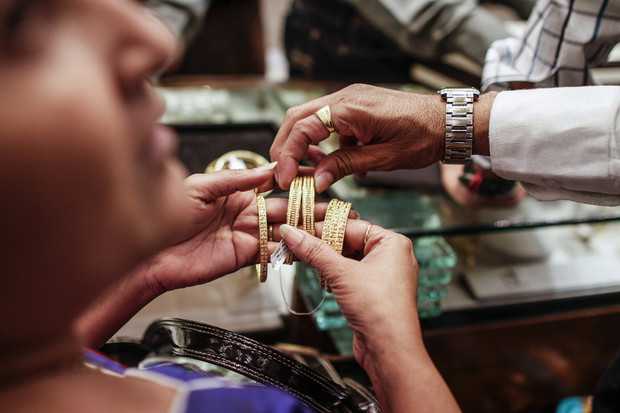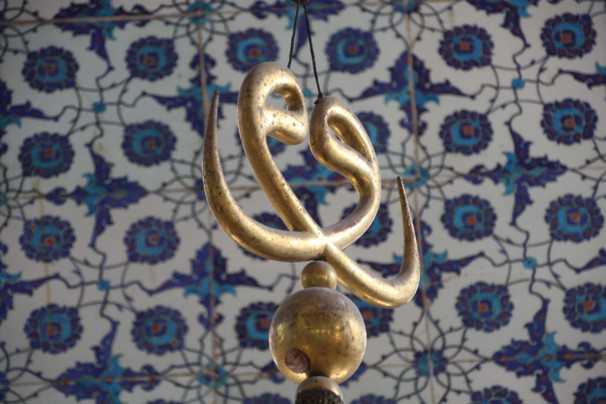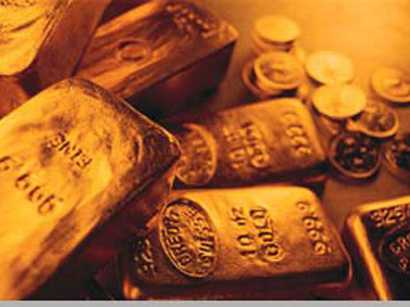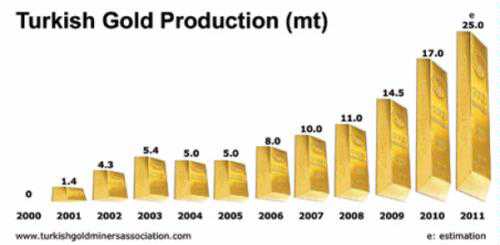
Surging demand for gold from Dubai to Istanbul has pushed physical premiums in the region to levels not seen in years as the biggest price slump in three decades lures consumers, according to MKS (Switzerland) SA.
Gold fell to the lowest in more than two years this month on speculation that the global economy is recovering, unleashing a purchasing frenzy among coin and jewelry buyers from China to the U.S. Consumer demand for jewelry, bars and coins inTurkey and the Middle East represented about 9.4 percent of the global total last year, according to the World Gold Council. Bars have been cleared from display in the souks, according to Gerry Schubert, head of precious metals at Emirates NBD PJSC.
“Physical demand has been tremendous in a way I haven’t seen for a number of years,” said Jeffrey Rhodes, global head of precious metals at INTL FCStone Inc., who’s worked in the industry for more than three decades. “The price collapse prompted a physical gold rush and the evidence of the extent of that is the prolonged period of high premiums that we’ve seen. Reports from the gold souks are that business is good,” Rhodes said from Dubai.
Bear Market
Prices plunged 14 percent in the two sessions to April 15, the most since 1983, and reached a low of $1,321.95 an ounce on April 16. Since then, spot bullion has rebounded 11 percent to $1,469.54 today as the surge in physical demand offset record outflows from exchange-traded products. Gold is still lower in April, heading for the worst monthly loss since December 2011 amid a bear market.
In Turkey, the fourth-biggest gold consumer last year, bullion on the Istanbul Gold Exchange traded at premiums of as much as $25 an ounce over the London spot price, something that hasn’t happened in “a very long time, we’re talking years,” said MKS’s Panizzutti.
“In the gold souk, you see some coins left over, but the investment bars are all gone from the windows,” said Schubert at Dubai-based Emirates NBD, the United Arab Emirates’ second- biggest bank by assets. Domestic retail prices moved to a premium of about $5 an ounce from a small discount before the rout, said Schubert, who has traded the metal since 1979.
Largest Center
Dubai is the largest gold-trading center in the Middle East, according to the Dubai Gold & Jewellery Group, an industry body that includes manufacturers and retailers. Trade was worth about $56 billion in 2011, up from $6 billion in 2003, according to data on the Dubai Multi Commodities Centre website.
Gold jumped 4.2 percent last week, the most in 15 months, as coin demand from mints in the U.S. and Australia to the U.K. soared. The volume for the benchmark contract on the Shanghai Gold Exchange surged to a record last week, while premiums to secure supplies in Indiajumped to five times the level before the slump. China and India are the world’s largest buyers.
Consumers in Singapore and Hong Kong are paying premiums of about $3 an ounce, compared with about $2 just after the rout, according to Ng Cheng Thye, head of precious metals at Standard Merchant Bank (Asia) Ltd.
‘More Patient’
“Physical metal is still not available,” Ng said by phone from Singapore. “The Chinese are on holiday these few days and at this level, the market might slow down a bit on the demand side. People are a little bit more patient now compared with two weeks ago, where everybody was rushing for physical metal.”
Chow Sang Sang Holdings International Ltd. said that jewelry sales at its 44 shops in Hong Kong more than doubled in the two weeks ended April 27 from a year ago. In China, financial markets are closed through May 1.
“It’s not just a Middle East story, it’s all across the globe,” said Panizzutti. “The fact that premiums are so high, it means that no one is making enough. We are producing 24 hours a day.”





